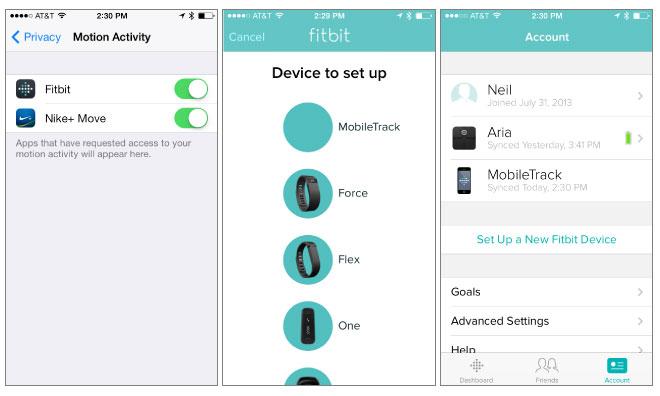A Monday update to fitness tracking company Fitbit's iOS app brought several visual tweaks along with a new "MobileTrack" feature that leverages Apple's new M7 motion coprocessor to turn an iPhone 5s into a basic personal activity tracker.
According to Fitbit, the MobileTrack feature combines with the M7 to let users track steps, distance, and calories burned. The company advertises MobileTrack as a feature for Apple's flagship iPhone 5s, but there is no indication that it would not work on Apple's other M7-equipped devices, the iPad Air and second-generation iPad mini.
The update also brings a redesign to the wristband's silent alarm setup, making it easier to configure the vibrating alarm clock. The app's profile editor, tracker settings, and sign-up flow have also received a visual overhaul.
In addition, you can now tap on friends in the Friend Finder to view that person's Fitbit profile and use gestures to cheer, taunt, or message them from the app's leaderboard.
Fitbit is the latest in a series of popular fitness-related apps — Â including Nike+ Move and Runkeeper — to leverage the M7. Apple's M7, introduced alongside the iPhone 5s, is a discrete processor on the device's logic board that monitors inputs from the device's accelerometer and gyroscope at extremely low power, conserving battery life.
The FitBit app is a free, 10.6-megabyte download from the App Store.
 Shane Cole
Shane Cole








 William Gallagher
William Gallagher
 Wesley Hilliard
Wesley Hilliard

 Christine McKee
Christine McKee
 Malcolm Owen
Malcolm Owen

 Andrew Orr
Andrew Orr





-m.jpg)




4 Comments
" The company advertises MobileTrack as a feature for Apple's flagship iPhone 5s, but there is no indication that it would not work on Apple's other M7-equipped devices, the iPad Air and second-generation iPad mini." ... except that on the iPad Air, it doesn't appear as an option.
Strangely, Apple has purposely disabled step tracker functionality of the M7 on the new iPads that contain the M7 chip. I know this because I'm a developer who updated my app's UI to support the iPad prior to the new iPads being released only to find out the step counting function does not work. The CoreMotion API for the M7 chip returns false when you ask it if step counting is available.
Also coincidentally, my M7 app update was accepted by Apple today and it adds a feature that puts it roughly in line with the hardware version of the FitBit - the ability to measure trip elapsed time/distance/steps/speed. You can check it out on the app store here if you are interested: https://itunes.apple.com/us/app/steptracker/id714439468?ls=1&mt=8
Strangely, Apple has purposely disabled step tracker functionality of the M7 on the new iPads that contain the M7 chip. I know this because I'm a developer who updated my app's UI to support the iPad prior to the new iPads being released only to find out the step counting function does not work. The CoreMotion API for the M7 chip returns false when you ask it if step counting is available.
Also coincidentally, my M7 app update was accepted by Apple today and it adds a feature that puts it roughly in line with the hardware version of the FitBit - the ability to measure trip elapsed time/distance/steps/speed. You can check it out on the app store here if you are interested: https://itunes.apple.com/us/app/steptracker/id714439468?ls=1&mt=8
Cool, seems like a nice app! Out of curiosity, does the M7 work as well on a treadmill as while actually walking from point A to point B?
[quote name="marubeni" url="/t/161396/fitbit-taps-apples-m7-chip-for-new-mobiletrack-ios-app-feature#post_2451721"]Cool, seems like a nice app! Out of curiosity, does the M7 work as well on a treadmill as while actually walking from point A to point B? [/quote] Yes, since it does not rely on the GPS it should work just fine.